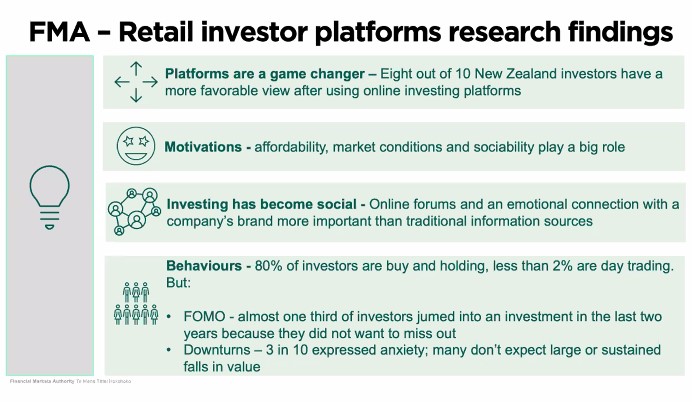Regulation roadblock for retail investment
Most investors want basic, pragmatic support when it comes to their investments but regulation can be a roadblock, says Smartshares' Hugh Stevens.
Monday, November 15th 2021, 6:00AM  2 Comments
2 Comments
by Matthew Martin

The Smartshares chief executive told viewers of a recent Financial Services Council webinar that while individual financial advice is still important, most investors just want to know things like how to read an annual report.
"And it's very hard in the current regime - you're either providing no advice or you are providing financial advice - and there doesn't seem to be much room in the middle for just being practical or sensible in helping people make good solid decisions."
He says the middle ground - which is not financial advice, it's just basic support - should be a focus for the country's financial regulators when they think about the future of retail investment.
Stevens was joined on the panel by the co-founder and general manager of Hatch, Kristen Lunman who says far from being naive, retail investors are pretty savvy and despite some mistrust of retail investment platforms across the industry, retail investors do not make many bad decisions.
She says "participation is power" and was pleased by the behaviour of more than 60% of Hatch's clients after the Covid crash who held back from selling their portfolios.
Those making bad decisions are not as well educated, don't learn about risk tolerances and have no concept of long-term saving, she says.
She agrees with Stevens about having no middle ground for financial advice.

"What we have to do is meet these investors on their terms...is this some sort of in-between advice or if it's videos or social engagement or even communities, we do have to meet them on their terms."
Also on the panel was co-founder and director of manuka Capital Bill Cheney who says retail investment platforms were stress-tested during last year's Covid-inspired market downturn and passed the test.
"The industry needs to create compelling engagement with users who stay with it for the long term...by and large, people are behaving responsibly with due care and caution...making investing a rewarding endeavour."
The Financial Markets Authority's investor capability manager Gillian Boyes says the FMA were concerned retail investors could be taking unnecessary risks but a recent study produced some reassuring results.
She says 80% of those surveyed were buying and holding and less than 2% were day-traders.
She says good investment behaviours such as comparative research were being used but the fear of missing out (FOMO) and how downturns can hurt was still problematic.
| « Stubbs vows to reduce fees after Simplicity hits the $4 billion mark | Tough times ahead for NZ economy: Nikko economist » |
Special Offers
Comments from our readers
Hugh Stevens did an outstanding job alienating advisers as it seems he doesn't need them. This middle ground he speaks of would be....Smartshares direct. It sounds like he wants his cake and eat it. No need for a middle ground Hugh, you can give advice. It does come at a cost and consequences if it's not up to standard. You know, like us advisers have. Could Smartshares now be an oxymoron?
Kristen Lunman, it's great that these low entry platforms have encouraged many to dip their toes in the capital markets. Albeit chump change for the average investor, but crowing success about "more than 60% of Hatch's clients after the Covid crash held back from selling their portfolios." 90%+ might have been something to be proud of.
For my advised clients and many of my colleagues, if not all, the number was and is 100%.
My apologies if I have read this wrong, but it looks like further evidence of VIO's growing in our industry. But apparently we are somehow different to Australia.
Sign In to add your comment
| Printable version | Email to a friend |




It maybe worth the Smartshares Chief Executive meeting actual investors, as my experience shows:
1. Here's my $100, please provide more than I'd receive in the bank
2. Here's my $100, I'd like it back when I need it
...other than that; most investors have little / no interest in what happens next.